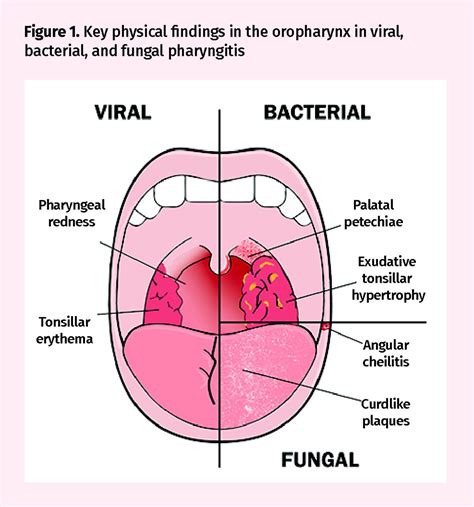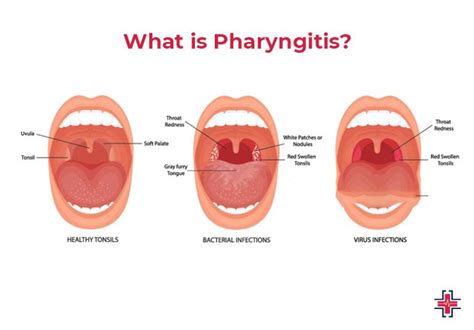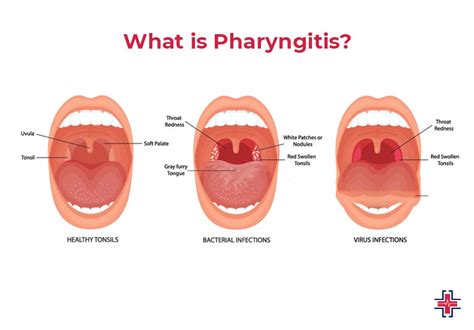Intro
Discover the medical term for sore throat, pharyngitis, and its causes, symptoms, and treatments, including home remedies and medications to alleviate throat pain and inflammation, and learn about related conditions like tonsillitis and laryngitis.
A sore throat, also known as pharyngitis, is a common condition that affects millions of people worldwide. It is characterized by inflammation and irritation of the pharynx, which is the tube that carries food and air from the mouth and nose to the esophagus and lungs. The medical term for a sore throat is pharyngitis, and it can be caused by a variety of factors, including viral and bacterial infections, allergies, and environmental irritants.
Pharyngitis is a widespread condition that can affect anyone, regardless of age or health status. It is estimated that over 40% of adults experience a sore throat at least once a year, and the condition is even more common in children. The symptoms of pharyngitis can vary depending on the underlying cause, but common symptoms include pain and discomfort when swallowing, hoarseness, and a scratchy or itchy sensation in the throat.
The importance of understanding the medical term for a sore throat cannot be overstated. By knowing the correct terminology, individuals can better communicate with healthcare professionals and access the necessary treatment and care. Moreover, understanding the causes and symptoms of pharyngitis can help individuals take preventative measures to reduce their risk of developing the condition. In this article, we will delve into the world of pharyngitis, exploring its causes, symptoms, diagnosis, and treatment options, as well as providing practical tips for managing and preventing the condition.
Causes of Pharyngitis

Viral Pharyngitis
Viral pharyngitis is the most common type of pharyngitis, and it is usually caused by a viral infection such as the common cold or flu. The symptoms of viral pharyngitis can include a sore throat, hoarseness, and a cough, as well as fatigue, headache, and muscle aches. Viral pharyngitis is highly contagious and can be spread through close contact with an infected person, as well as through touching contaminated surfaces and objects.Bacterial Pharyngitis
Bacterial pharyngitis is less common than viral pharyngitis but can be more serious. It is usually caused by a bacterial infection such as strep throat, which is caused by the Streptococcus pyogenes bacterium. The symptoms of bacterial pharyngitis can include a severe sore throat, fever, and swollen lymph nodes, as well as a white or yellowish coating on the tonsils. Bacterial pharyngitis requires prompt medical attention and treatment with antibiotics to prevent complications and reduce the risk of transmission to others.Symptoms of Pharyngitis

In some cases, pharyngitis can also cause more severe symptoms, such as difficulty breathing or swallowing, severe headache, or a stiff neck. If you experience any of these symptoms, it is essential to seek medical attention promptly.
Diagnosis of Pharyngitis
Diagnosing pharyngitis typically involves a physical examination and a review of your medical history. Your healthcare provider may also perform a throat swab or culture to determine the underlying cause of your symptoms. In some cases, additional tests such as a complete blood count (CBC) or a mononucleosis test may be ordered to rule out other conditions.Treatment Options for Pharyngitis

In addition to medical treatment, there are several self-care measures you can take to help manage and prevent pharyngitis. These include:
- Getting plenty of rest and staying hydrated
- Avoiding close contact with others to prevent transmission
- Practicing good hygiene, such as washing your hands frequently and avoiding touching your face
- Avoiding irritants such as smoke and pollution
- Using a humidifier to add moisture to the air and reduce throat irritation
Home Remedies for Pharyngitis
There are several home remedies that can help alleviate the symptoms of pharyngitis. These include: * Gargling with warm salt water to reduce throat inflammation and kill bacteria * Drinking warm liquids, such as tea or broth, to soothe the throat * Using a throat spray or lozenge to numb the throat and reduce pain * Eating cold or soft foods to reduce throat irritation * Avoiding spicy or acidic foods that can irritate the throatPrevention of Pharyngitis

By following these tips and taking prompt medical attention when symptoms occur, you can reduce your risk of developing pharyngitis and prevent complications.
Complications of Pharyngitis
If left untreated, pharyngitis can lead to several complications, including: * Abscesses or pockets of pus that form in the throat * Sinusitis or infection of the sinuses * Ear infections * Rheumatic fever, a condition that can cause heart damage * Kidney damageIt is essential to seek medical attention promptly if you experience any symptoms of pharyngitis, especially if you have a weakened immune system or are at risk for complications.
What is the most common cause of pharyngitis?
+Viral infections, such as the common cold and flu, are the most common cause of pharyngitis, accounting for over 80% of cases.
How is pharyngitis diagnosed?
+Diagnosing pharyngitis typically involves a physical examination and a review of your medical history. Your healthcare provider may also perform a throat swab or culture to determine the underlying cause of your symptoms.
Can pharyngitis be prevented?
+Yes, preventing pharyngitis requires a combination of good hygiene practices, a healthy lifestyle, and prompt medical attention when symptoms occur. Some tips for preventing pharyngitis include practicing good hygiene, avoiding close contact with others who have a sore throat or other respiratory infection, and getting plenty of rest and staying hydrated.
In conclusion, pharyngitis is a common condition that can be caused by a variety of factors, including viral and bacterial infections, allergies, and environmental irritants. By understanding the causes, symptoms, diagnosis, and treatment options for pharyngitis, individuals can take steps to manage and prevent the condition. We encourage you to share this article with others and to take prompt medical attention if you experience any symptoms of pharyngitis. Remember, a healthy lifestyle and good hygiene practices are key to preventing pharyngitis and reducing the risk of complications. If you have any further questions or concerns, please do not hesitate to comment below.
